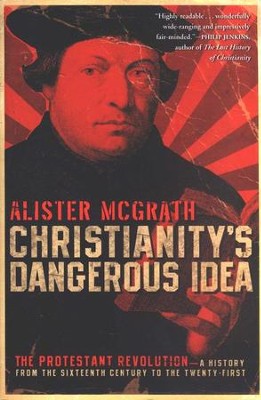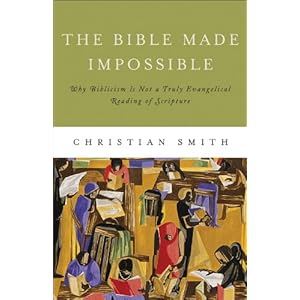I am going to reserve
comment on the quotation from the title of this thread until the end of this
post, focusing instead, for now, on Alister McGrath's, Christianity's
Dangerous Idea: The Protestant Revolution, which I recently finished
reading (link
to Google Books preview).
I had actually purchased
this book—along with a number of others—a few months back, but did not get
around to reading it until just a few days ago. Dr. McGrath is one of my
favorite Protestant authors, especially his works on Christian history (both
history proper, as well as historical theology), and this book did not
disappoint. If one is looking for a polemical treatment on the subject he
addresses, don't bother purchasing the book; but, if one is looking for a concise, objective and balanced contribution, definitely get a hold of a copy.
His introduction sets the
tone (of course) for the book, beginning with some reflections on the July 1998
Lambeth Conference. From the pen of Dr. McGrath we read:
In July 1998, the bishops
of the Anglican Communion met in the historic English cathedral city of
Canterbury for their traditional Lambeth Conference, held every ten years. The intention was to address the many
challenges and opportunities that Anglicanism faced worldwide...The bishops gathered
every day for prayer and Bible study, a powerful affirmation of the role of the
Bible in sustaining Christian unity, guiding the church in turbulent times, and
nourishing personal spirituality.
But how was the Bible to
be interpreted...
How, many Anglicans
wondered, could the Bible be the basis for their identify and unity when there
was such obvious disunity on how it was to be understood? How could a
text-based movement have a coherent inner identify when there was such a clear
and fundamental disagreement on how that text was to be interpreted and applied
on an issue of critical importance?
The idea that lay at the
heart of the sixteenth-century Reformation, which brought Anglicanism and the
other Protestant churches into being, was that the Bible is capable of being
understood by all Christian believers—and that they all have the right to
interpret it and to insist upon their perspectives being taken seriously. Yet
this powerful affirmation of spiritual democracy ended up unleashing forces that
threatened to destabilize the church, eventually leading to fissure and
formation of breakaway groups...
The dangerous new idea,
firmly embodied at the heart of the Protestant revolution, was that all
Christians have the right to interpret the Bible for themselves. However, it
ultimately proved uncontrollable, spawning developments that few at the time
could have envisaged or predicted. (Pages 1, 2)
On the next page, he
raises two very important questions:
Who has the authority to
define its faith? Who has the right to interpret its fundamental document, the
Bible? (Page 3)
This is followed with:
The outbreak of the
Peasant's War in 1525 brought home to Luther that his new approach was
dangerous and ultimately uncontrollable. If every individual was able to
interpret the Bible as he pleased, the outcome could only be anarchy and
radical individualism. Too late, Luther tried to rein in the movement by
emphasizing the importance of authorized leaders, such as himself, and
institutions in the interpretation of the Bible. But who, his critics asked,
"authorized" these so-called authorities? (Page 3 - bold emphasis
mine.)
The above questions are
repeated throughout the book. In addition to strict individualism, the issue of
competing "authorities" creating fragmentation almost from the very
beginning of the Protestant revolt/revolution are raised. Dr. McGrath states that,
"There was no single Wittenberg reforming program, no single approach to
biblical interpretation and application" (p. 65).
Is it any wonder that such
problems were greatly magnified as the revolt/revolution spread from
Wittenberg?
McGrath moves on from
Wittenberg to Zurich and Zwingli, then to the Anabaptists; and in chapter 4, to
John Calvin. Chapter 5 is devoted to England and the "Emergence of Anglicanism",
which is followed by "European Protestantism in Crisis, 1560–1800"
(ch. 6), and then "Protestantism in America" (ch. 7).
Questions concerning
authority and interpretation continue. Chapter 10, "The Bible and
Protestantism" is excellent, containing reflections on the issues of sola
scriptura, translations, commentaries, lectionaries, theological works and
the canon.
On page 209, he writes:
Since every Protestant has
the right to interpret the Bible, a wide range of interpretations cannot be avoided.
And since there is no centralized authority within Protestantism, this
proliferation of options cannot be controlled. Who has the right to decide what
is orthodox and what is heretical?
And just a bit later he
states:
Over the years, each
strand of Protestantism developed its own way of understanding and implementing
the sola Scriptura principle.
Dr. McGrath has added
confirmation to many important issues that have been raised here at AF.
From almost the beginning of this blog, I have pointed out that the assessments
of A.N.S. Lane in his important article, “Scripture,
Tradition and Church: An Historical Survey” (LINK), raise some serious, unanswered problems for the
Protestant paradigm. The following quotation from Lane's work has been
published at the bottom of the right side-bar of this blog for nearly a decade
now:
The Reformers unequivocally rejected
the teaching authority of the Roman Catholic Church. This left open the
question of who should interpret Scripture. The Reformation was not a struggle
for the right of private judgement. The Reformers feared private
judgement almost as much as did the Catholics and were not slow to
attack it in its Anabaptist manifestation. The Reformation principle was not
private judgement but the perspicuity of the Scriptures. Scripture was ‘sui
ipsius interpres’ and the simple principle of interpreting individual passages
by the whole was to lead to unanimity in understanding. This came close to
creating anew the infallible church…It was this belief in the clarity of
Scripture that made the early disputes between Protestants so fierce. This
theory seemed plausible while the majority of Protestants held to Lutheran or
Calvinist orthodoxy but the seventeenth century saw the beginning of the
erosion of these monopolies. But even in 1530 Casper Schwenckfeld could
cynically note that ‘the Papists damn the Lutherans; the Lutherans damn the
Zwinglians; the Zwinglians damn the Anabaptists and the Anabaptists damn all
others.’ By the end of the seventeenth century many others saw that it
was not possible on the basis of Scripture alone to build up a detailed
orthodoxy commanding general assent. (A.N.S. Lane, “Scripture,
Tradition and Church: An Historical Survey”, Vox Evangelica, Volume IX
– 1975, pp. 44, 45 – bold emphasis mine.)
And back in
Nov. 2009, I posted the following from yet another Reformed author:
Unlike modern
Evangelicalism, the classical Protestant Reformers held to a high view of the
Church. When the Reformers confessed extra ecclesiam nulla salus, which means
“there is no salvation outside the Church,” they were not referring to the
invisible Church of all the elect. Such a statement would be tantamount to
saying that outside of salvation there is no salvation. It would be a truism.
The Reformers were referring to the visible Church…The Church is the pillar and
ground, the interpreter, teacher, and proclaimer of God’s Word…The Church has
authority because Christ gave the Church authority. The Christian who rejects
the authority of the Church rejects the authority of the One who sent her (Luke
10:16). (Keith A. Mathison, The Shape of Sola Scriptura, pp. 268,
269.)
Clearly, the questions of
individual interpretation and authority outside the Bible itself raised by Dr.
McGrath are/were also on the minds of Lane and Mathison.
And so, with all this in
mind, I shall ask: how does one determine which interpretation of the Bible is
the correct one? And further, is there an authority in place which/who has the
approval from God himself to provide the correct interpretation of His Word?
Now, back to the opening quotation/title of this
thread:
"you will receive no other law for your belief than that interpretation of the Scripture which seems to you the best"
This quotation is from
Francis de Sales, The Catholic Controversy (page 3, of Mackey's English
trans., third edition, 1909 - PDF version available online HERE).
For anyone who has ever
pondered over the questions raised by Dr. McGrath, I sincerely believe that you
owe it to yourself to read de Sales thoughtful answers.
Grace and peace,

